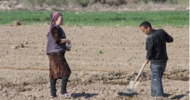Water grabbing refers to situations where powerful actors take control of valuable water resources for their own benefit, depriving local communities whose livelihoods often depend on these resources and ecosystems.
AN extraordinary new process has been at work in the past few years: the aggressive entry of Indian corporations into the markets for agricultural land in Africa, writes Jayati Gosh
- Frontline
-
09 September 2011
Large-scale agricultural in the developing world have received significant attention in recent months and years. This articles looks at the dynamics of the Ethiopian context and policy recommendations in moving forward.
- Logan Cochrane
-
01 October 2012
The Ethiopian government says that it will no longer impose export quotas on commercial farm outputs and processed goods as a part of its commitment for the new partnership introduced by G-8 countries that focuses on facilitating private sector investment in African agriculture.
- Addis Fortune
-
16 September 2012
The case stems from accusations lodged by the Djiboutian Ambassador in 2018, asserting that Karuturi neglected to meet the terms of agricultural agreements signed in 2011 and 2012 for activities in Ethiopia.
According to Rana Kapoor, head of India's Yes Bank, Africa offers immense opportunity in terms of investment in large-scale commercial farming, quoting rates of return of 18-21% and above.
- Hindu Business Line
-
19 February 2012
Ramesh Krishnaswamy of Karuturi Global in an exclusive interview with CNBC-TV18
Area nearly the size of France purchased, leased for food production around the world Africa, South America, parts of Europe targeted by cash-rich, food-poor nations
- Circle of Blue
-
17 November 2009
There’s a whole school of economic thought that says that Collier is wrong, that big is not necessarily better in agriculture — and that the land deals therefore might be unwise not because they’re wrong but because they’re unprofitable.
- New York Times
-
19 November 2009
Human rights advocates criticize the bank for failing to speak up about the jailing of a former employee in Ethiopia and two other environmental defenders
A slide show by GRAIN that profiles some of those who have been most actively pursuing or supporting farmland grabs around the world.
Modern machineries of all sorts, owned and run by agri-companies, are turning the soils inside out, destroying forests and beginning to pollute the environment to get more production.
In Ethiopia, resentments over land grab have already started claiming lives. The TPLF regime has already killed 10 protesting ethnic Anuak farmers and has sent thousands more to concentration camps.
- Ethiomedia
-
04 January 2011
What we are witnessing in countries like Ethiopia today is an extreme form of the banana republic syndrome.
Karuturi, which has 300,000 ha in Ethiopia, is now targeting the DRC, Tanzania, Mozambique, Senegal and Sierra Leone.
- Business World
-
02 June 2012
Joining the neo-colonial bandwagon, Indian companies are taking over agricultural land in African nations and exporting produced food at the cost of locals
- Goimonitor.com
-
21 December 2011
A land grab is taking place all across Africa, a transfer of control unprecedented in the post-colonial era.
A controversial new farms policy has led to a number of arrests and the killings of 10 local farmers, say local activists.
Countries that have recently invited India, through the ministry of agriculture, to lease land for farming include Egypt, Ethiopia, Mongolia, Senegal, Sudan, Trinidad and Tobago and Tunisia.
- InfoChange India
-
05 April 2010
An Observer investigation reveals how rich countries faced by a global food shortage now farm an area double the size of the UK to guarantee supplies for their citizens
A delegation of 26 Egyptian agriculture companies led by Minister of Agriculture Amin Abaza, is now inspecting land proposed by the Ethiopian government for Egyptian investment projects.
- NewBusinessEthiopia.com
-
30 December 2009
BRICS states, except Russia, are enhancing and facilitating land grabs abroad in a way that is inconsistent with their proclamations of sustainable development, cooperation solidarity, and respect of national sovereignty.
Africa’s agriculture and food industries are attracting increasing interest from investors. This trend is largely fuelled by the fact that the continent has 60% of the world’s uncultivated arable land, with favourable weather conditions in many countries.
- HowWeMadeItInAfrica
-
27 February 2013
Thousands of Ethiopians are being relocated or have already fled as their land is sold off to foreign investors without their consent.
- Guardian
-
07 February 2013
Major agricultural investor in Ethiopia, Saudi Star, has bigger problems there than it might have expected.
- African Agriculture
-
06 June 2012
The scariest aspect of this unfolding phenomenon is that despite the foreseeable terrible consequences, the appetite among the rich countries to own a piece of this developing-country fertile land continues to grow, turning to an ugly competition.
- Peace & Conflict Monitor
-
29 February 2012
Karuturi Agro Products Plc, part of holding company Karuturi Glolabal Ltd, is planning to go public, floating 200,000 shares worth 1,000 Br each to Ethiopian investors, once it gets the nod from its board of directors.
- Addis Fortune
-
30 January 2012
Fear of unrest and hunger for profit are sparking massive acquisitions of farmland.
- In These Times
-
22 August 2011
Director of agricultural investment at Ethiopia's Ministry of Agriculture says Karuturi is on the verge of collapsing in Ethiopia and that the company "has gone bankrupt following internal management crisis”
- The Reporter
-
17 January 2015
The G8 countries are implementing a New Alliance for Food Security and Nutrition in six African countries that will facilitate the transfer of control over African agriculture from peasants to foreign agribusiness.















